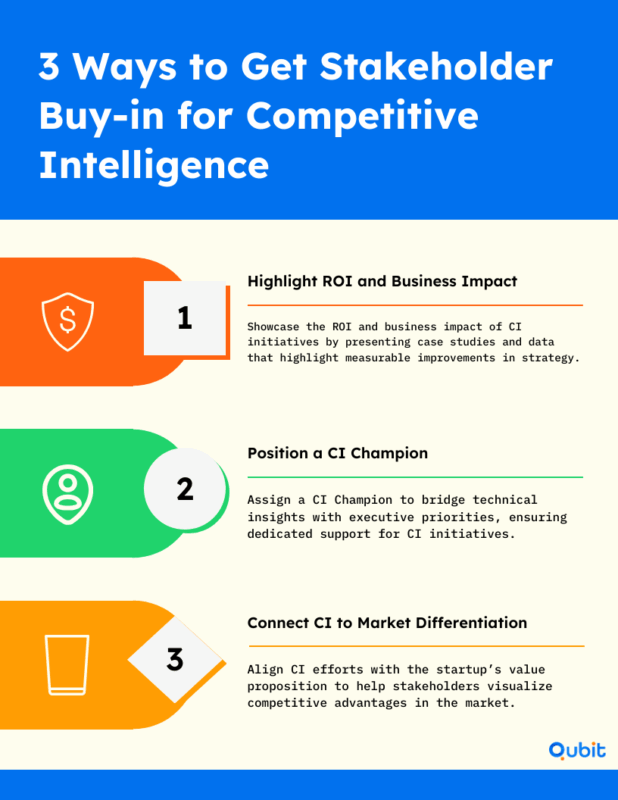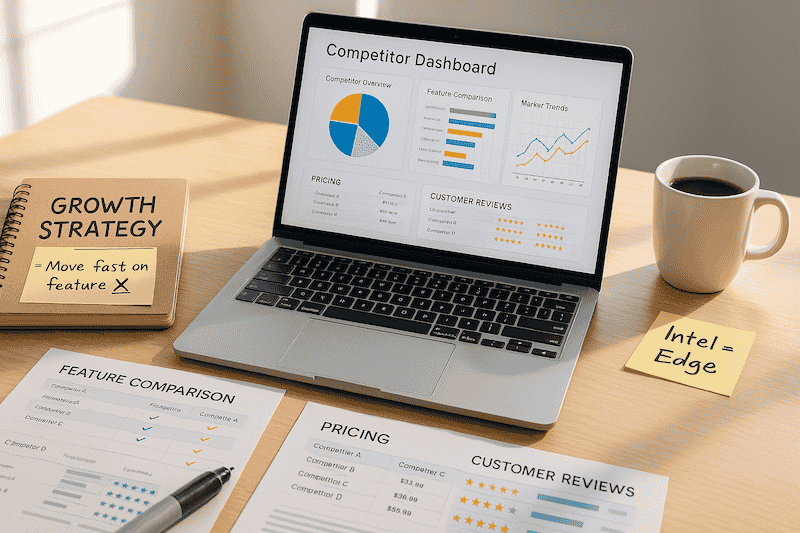Competitive intelligence (CI) is the cornerstone of strategic decision-making, enabling businesses to thrive in dynamic markets. By systematically gathering and analyzing data about competitors, companies can uncover opportunities, mitigate risks, and refine their strategies. Whether you're exploring what is competitive intelligence or seeking actionable insights, CI empowers organizations to stay ahead of the curve.
Understanding how to find investors for startups often complements competitive intelligence, as securing the right investors requires showcasing strategic positioning and market insights.
From benchmarking efforts to refining CI workflows, the following sections will explore how CI can propel growth, attract stakeholders, and foster innovation. Let's dive into the strategies that make competitive intelligence an indispensable tool for success.
Importance of CI for Startups: Building a Competitive Edge
Understanding what is competitive intelligence is crucial for competitive analysis for startups. It helps businesses aiming to stay ahead in their industry. But standing out in a crowded market requires more than just a great idea.
Competitive intelligence (CI) is a critical tool for emerging businesses aiming to differentiate themselves and drive innovation. By analyzing structured competitive intelligence reports, startups can uncover insights into competitor strategies, market trends, and customer preferences. This information becomes the foundation for making informed decisions that steer the business toward sustainable growth.
Tracking competitor moves is especially vital for startups. It allows them to anticipate shifts in the market and adapt their strategies accordingly. Structured CI reports not only highlight opportunities but also expose potential threats, enabling startups to stay agile and proactive. For instance, understanding how to identify competitors is a crucial first step in building a robust CI framework. Identifying competitors unveils key insights about market dynamics, enabling startups to anticipate challenges and opportunities.
Incorporating CI into a startup’s strategy fosters innovation by revealing gaps in the market that can be filled with unique solutions. It also ensures that startups remain competitive by staying one step ahead of industry trends. For businesses looking to establish a foothold in their sector, CI is not just an advantage—it’s a necessity.
Securing Stakeholder Buy-In Using CI Data: Strategies for Persuasion
Convincing stakeholders to support competitive intelligence tools and resources requires a blend of strategic communication and actionable insights. Executives and investors often prioritize measurable outcomes, making it essential to present CI data as a driver of tangible business growth.

1. Highlight ROI and Business Impact
Stakeholders are more likely to approve CI investments when presented with clear evidence of its return on investment. Use case studies or data-driven examples to demonstrate how competitive intelligence in marketing has helped businesses identify market gaps, refine strategies, and outperform competitors. Quantifying potential gains ensures decision-makers see the value in adopting CI tools.
2. Position a CI Champion
A dedicated CI champion can play a pivotal role in advocating for adoption. This individual should have a deep understanding of CI tools and the ability to articulate their benefits effectively. By spearheading initiatives and aligning CI goals with broader business objectives, the champion can bridge the gap between technical insights and executive priorities.
3. Connect CI to Market Differentiation
Competitive intelligence can directly support a startup unique value proposition, helping businesses articulate their strengths in crowded markets. Crafting a startup unique value proposition ensures businesses effectively communicate their strengths and competitive advantages, making it easier for stakeholders to see the strategic importance of CI tools.
Persuading stakeholders requires a well-rounded approach that combines data, leadership, and alignment with business goals.
Essential Metrics: What Should You Track in CI?
Understanding which metrics to monitor is crucial for startups employing competitive intelligence methodologies. Key areas to focus on include content marketing performance, pricing strategies, and social media engagement. Each of these metrics offers unique insights into how competitors are positioning themselves and how your startup can refine its approach.
Content Marketing Metrics
Tracking metrics such as website traffic, keyword rankings, and conversion rates can reveal how competitors attract and retain their audience. These insights help startups identify gaps in their own strategies and optimize their content to drive better results.
Pricing Metrics
Analyzing competitor pricing models allows startups to assess market positioning and uncover opportunities for differentiation. Regularly monitoring price changes and promotions can also highlight trends that may impact your own pricing strategy.
Social Media Metrics
Engagement rates, follower growth, and sentiment analysis on social platforms provide valuable information about competitor outreach and audience preferences. These metrics can guide startups in crafting more effective campaigns to resonate with their target market.
Benchmarking plays a pivotal role in competitive intelligence. Learning how to conduct SWOT analysis for startups can further enhance benchmarking efforts, enabling structured assessments of both competitors and your own business.
Attracting VC with Robust CI Data: Turning Insights into Investment
Securing venture capital often hinges on how effectively startups can present their unique value. Competitive intelligence analysis plays a pivotal role in this process, enabling founders to craft pitch decks that stand out.
- Leverage Competitive Intelligence:
Incorporate detailed CI data into your pitch decks to showcase a deep understanding of the market and highlight your unique competitive edge. - Real-Time Competitor Monitoring:
Use tools that monitor competitors to ensure your pitch reflects current market dynamics, pinpointing market gaps your solution addresses. - Differentiate Your Business:
Robust CI data helps articulate your unique positioning and provides evidence-backed growth strategies, making your business case more compelling to investors. - Build Investor Confidence:
Presenting CI-driven insights demonstrates preparedness and agility, reassuring investors that your startup is responsive to industry changes. - Embrace CI as a Strategic Cornerstone:
Incorporate competitive intelligence analysis into your investment strategy to build trust through informed, strategic decision-making, not just to impress investors.
Hiring and Retaining Top Talent with CI Insights
Understanding the recruitment strategies of competitors can provide valuable insights for shaping your own hiring approach. Competitive business intelligence empowers organizations to refine their company culture, benefits, and leadership strategies to attract top-tier talent. By analyzing how competitors structure their benefits packages or promote their workplace environment, businesses can identify gaps and opportunities to make their own offerings more appealing.
Retention is equally critical. Continuous monitoring of competitors’ recruitment tactics allows companies to stay ahead of industry trends and adapt to shifting employee expectations. For instance, if competitors are emphasizing flexible work arrangements or professional development programs, these insights can guide your organization in implementing similar initiatives to retain high-performing employees.
A proactive approach to competitive intelligence ensures that your company remains attractive to both current and prospective talent. By fostering a culture that aligns with market demands and employee aspirations, businesses can maintain a competitive edge in recruitment and retention.
CI Solutions and Technology
Competitive intelligence (CI) thrives on the integration of advanced tools and methodologies. From specialized software platforms to consulting services, technology plays a pivotal role in streamlining CI initiatives. Platforms like CI-specific analytics tools enable businesses to track market trends, competitor activities, and customer insights with precision. Additionally, frameworks designed for data visualization and reporting enhance the accessibility of actionable intelligence.
Consulting services further complement these technologies by offering tailored strategies and expertise, ensuring businesses maximize their CI efforts. By combining these resources, organizations can transform raw data into strategic insights that drive informed decision-making and sustainable growth.
Real-World CI Use Cases: Startup Success Stories
Competitive intelligence has proven to be a game-changer for startups seeking to refine their strategies and achieve growth. One notable example involves a tech startup that identified a gap in its competitors’ product offerings through CI analysis. By pivoting to address this unmet need, the company not only gained market traction but also secured significant funding.
Another success story comes from a food delivery startup that used CI to uncover shifting consumer preferences. Armed with this insight, they revamped their menu and marketing approach, resulting in a 40% increase in customer retention. These cases highlight how CI can propel startups toward sustainable success.
Conclusion
Securing investor trust demands a combination of clear storytelling and data-driven insights. Throughout this blog, we’ve explored strategies that emphasize the importance of presenting a compelling narrative while backing it with robust, actionable data. These approaches not only help in building credibility but also position your startup competitively in a crowded market.
At Qubit Capital, we understand how critical it is to connect with the right investors who align with your vision. Our Investor Discovery and Mapping service is designed to bridge that gap. If you're looking to secure the right investors, we can help you identify and engage with those best suited to support your startup's growth.
Take the next step toward building meaningful investor relationships—partner with us to ensure your startup’s success.
Key Takeaways
- Competitive intelligence is essential for startup differentiation and growth.
- Actionable CI strategies improve stakeholder buy-in and attract VC support.
- Tracking key metrics and competitor moves informs strategic pivots.
- Advanced techniques such as data centralization and unique value articulation boost competitive positioning.
- Leveraging CI effectively can also optimize talent acquisition and retention processes.
Frequently asked Questions
What are the 7 P's of competitive intelligence?
The 7 P’s of competitive intelligence include Product, Price, Place, Promotion, People, Process, and Physical Evidence. For startups, this framework can guide the analysis of competitors’ strategies, helping to identify gaps and opportunities. For example, analyzing “Place” might reveal underserved markets, while “Promotion” insights can inspire innovative marketing campaigns.






